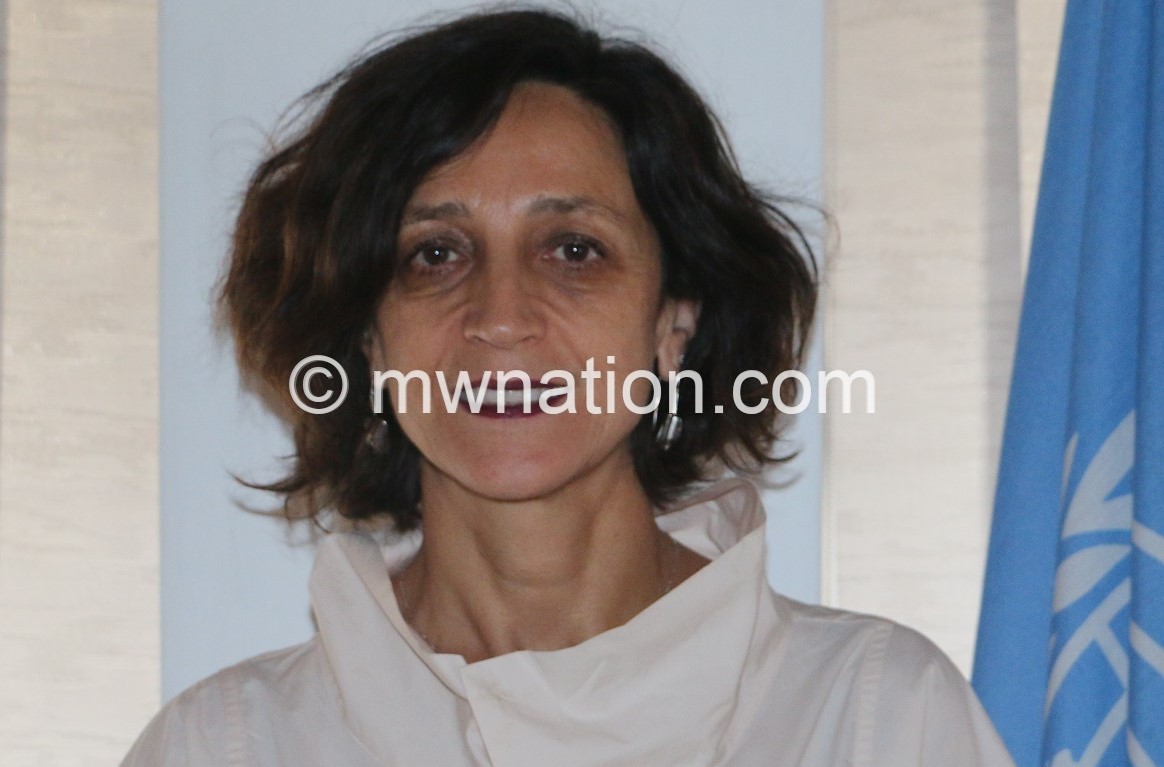‘We anticipate clean 2019 polls’
Following the departure of Mia Seppo in September last year, the United Nations Development Programme (UNDP) in Malawi last month welcomed new UN Resident Coordinator and UNDP Resident Representative, Maria Jose Torres Macho. Our reporter FATSANI GUNYA had a chat with the new UN chief on her first day in office and in this interview; Macho discusses her passion in serving the disadvantaged, her experience and aspirations as she embarks on leading the UN family in complementing various government efforts in the country. Excerpts:

Who is Maria Torres?
I am from Spain where I studied law and started my development career. I am passionate about the idea of making development work for people, enabling their access to rights, especially those that are left behind. My interest in this regard has, therefore, taken me to many countries where I have been part of UN’s humanitarian, political and development work; working with communities and national stakeholders to break the poverty cycle, promote peace and build resilience against shocks. My recent assignment was in Colombia where I served as UN’s senior post conflict adviser. I have also been assigned to the occupied Palestinian Territory, Somalia, Guatemala, Rwanda and New York where I have seen that when stakeholders, including local communities, are fully determined to advance human dignity for everybody, peace can be brokered, bridges on people’s differences can be built, social exclusion can be eliminated and sustainable development can take hold.
What are your first impressions about Malawi?
I am impressed by the peace Malawi has nurtured and the optimism for a more improved Malawi among its citizens, building on the country’s achievements such as increased access to safe water, reduced child and maternal mortality and increased access to primary education. The human rights agenda has also advanced in Malawi, with various stakeholders working to ensure that human rights for all are promoted. It is also clear that Malawi is on a positive path of consolidating her democracy and next year’s Tripartite Elections present a tremendous opportunity to demonstrate increasing maturity of the country’s democracy.
While recognising these achievements, I have also noted that improvements are still needed in many areas. One such area is management of the country’s population to avoid eroding its development gains. If this is not addressed, Malawi risks having 37 million people by 2050, more than double the current 18 million, which will complicate livelihoods, constrain access to social services and endanger natural resource.
What is your vision about the work of the UN in Malawi?
The UN exists to maintain international peace and security, promote human rights and, foster social and economic development. One way of achieving this is to create conditions for peace to flourish, including advancing human rights and sustainable development for all people. Hence, UN’s work in Malawi will continue to be based on universal human rights standards. Our vision is to help Malawi accelerate its development progress so that the country moves out of the category of countries with low human development to that of countries with high human development, where UN development assistance is no longer needed.
You have worked in many countries around the world, including those affected by conflicts like Somalia, what key things should Malawi maintain or improve on to enhance the country’s peace and democracy?
Consolidation of Malawi’s democracy and peace cannot happen without good governance that addresses the needs of the growing population and inequalities. Hence, it is important to continue to look beyond averages so that no one is left behind in the development agenda. Increasing citizen political participation, especially for women, can also help Malawi advance its democracy.
With the upcoming elections, what will be UN’s contribution during the electoral process to ensure Malawi conducts credible elections in May 2019?
The Malawi Electoral Commission [MEC] is the body responsible for conducting elections in Malawi. UN’s support to elections worldwide continues to be based on the principles outlined in the Universal Declaration of Human Rights—that the will of the people, as expressed through periodic and genuine elections, shall be the basis of government authority. As a result, through UNDP, the UN in Malawi offers strategic assistance throughout the electoral cycle, from support in designing more effective systems to mechanisms for addressing disputes after the votes are counted. The UN, together with its development partners, has been contributing technical and financial assistance to MEC to ensure adequate preparation for the 2019 Tripartite Elections. This support has continued from the 2014 Tripartite Elections. UNDP manages the Elections Basket Fund through which development partners channel their contributions to the electoral process. UN Women, is also working with various stakeholders to support initiatives aimed at increasing women’s political participation in the electoral process.
Malawi Government has just completed development of the new Malawi Growth and Development Strategy (MGDS III), how does the UN intend to support the country in the implementation of this national development strategy so that it is more successful than the previous ones?
The UN was a key partner in the formulation of the MGDS III. Moving to implementation, the UN is aligning its development work to the MGDS III. We are finalising formulation of the new United Nations Development Assistance Framework [UNDAF], through which UN agencies coordinate their contributions to Malawi. Our programmes will be directly linked to MGDS III. On implementation, the UN’s focus will be on promoting strong accountability for results, leaving no one behind, strengthening implementation mechanisms, addressing negative social norms that hinder development such as child marriages, and encouraging coherence of development interventions at the national and district levels, among others.
Anything special you would like to say as you start your mission to Malawi?
For development to be more effective, greater coordination among partners is vital and must be institutionalised. District councils should also lead in a sector approach to planning, encouraging all stakeholders, including the private sector, to coordinate planning, implementation and monitoring of activities. This can lead to better targeting of resources.





